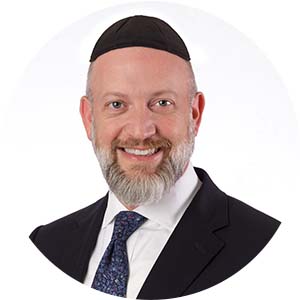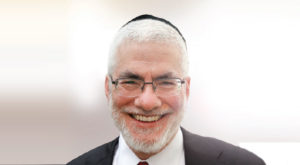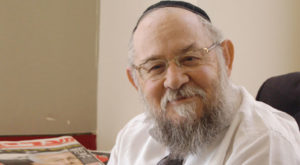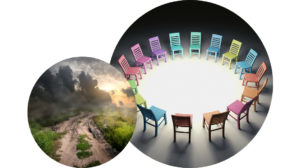Invisible or Inimitable

Teach kids that they’re one of a kind and irreplaceable
R
ecently, President Trump formally declared the nationwide opioid drug problem a public health emergency. Substance abuse is a growing epidemic that doesn’t discriminate based on religion, economic class, gender, or ethnicity. As we have come to learn all too well, the frum community is not immune, either. On Rosh Hashanah, a day of new beginnings and fresh starts, our community suffered a tragic loss when a precious young woman left this world way too prematurely due to a drug overdose.
The faces of the countless people who attended her funeral carried immense grief, profound loss, but also great fear. For many of her peers, this was not the first time saying goodbye to a friend who had succumbed to addiction — a challenge that can be managed, but never fully conquered. Some looked frozen by the realization that this could be them, that it may just be a matter of time until their family gets that dreaded call or makes that horrific discovery. There were parents there who have given every form of love and support to their struggling children and yet looked so helpless, even hopeless. One described to me the stress and anxiety of waiting every moment of every day to get a phone call that will turn their lives upside down forever.
Experts agree that drug and alcohol addiction are not about the substance, but rather about what pain the users are trying to escape, what hole in their hearts they are trying to fill, or what aspect of their lives they desperately want to be numb to. A young man I know recently wrote me a letter describing his experience with drugs and how he was using them to deny and escape his actual problem, the depression that was suffocating him. “For months during that year I would go to sleep every night hoping and praying I wouldn’t wake up the next morning, and every morning I would open my eyes and feel the crushing disappointment of having to endure another day. Modeh Ani seemed to be mocking me.”
Between 2010 and 2015, the depression rate among teens in America surged to a shocking 33 percent. Teen suicide attempts increased by 23 percent. While these numbers are dramatically lower in the frum community, they are still way too high and only growing. A recent paper published in Clinical Psychological Science correlates the increased mental health issues among young people with the rise of smartphones and social media. It turns out that being hyper-connected generates feelings of loneliness and insignificance.
In recent conversations with several young people struggling with depression, similar themes emerged: They feel invisible and inconsequential, they don’t know why they are here, and the world would be no different if they were gone. These unhealthy thoughts — which demand attention, intense therapy, and often medication — also provide an insight into what we can do to identify the population most at risk, to show support for those currently suffering, and to help former strugglers from relapsing.
Last year, on a tour of the Library of Congress, I commented to our guide that a book we were looking at was rare. She stopped me and said, “That book is not rare, it is unique, one of a kind.” That comment immediately got me thinking, not so much about the book, but about all of us.
So many people are struggling to find their place in the world, their value or worth. Too many people feel irrelevant or insignificant. We all need to know, believe, and, most importantly, feel, that we are not just rare — we are one of a kind and irreplaceable. We each have a unique mission in this world that cannot be accomplished by anyone else. We are each a tzelem Elokim, a distinct and special expression of the Ribbono shel Olam. We need to know and truly believe it about ourselves, and we need to instill that message in those around us.
Not only is Modeh Ani not mocking us, it is the formula for starting each and every day with a jolt of chizuk. We end Modeh Ani with the words rabbah emunasecha, which can be understood to mean that Hashem’s faith in us is great. We begin each day with a declaration that since we woke up this morning, our “contract” has been renewed for another day, which means that Hashem continues to have faith in us. We still have a role to play in His world and a mission to fulfill.
Communicating each person’s individual worth and value must be a fundamental goal of education and is a core responsibility of parents and mechanchim. The Piaseczna Rebbe, Rav Kalonymus Kalman Shapira, in his introduction to Chovas Hatalmidim, defines this as the essence of chinuch, education. Based on a Rashi (Bereishis 14:14), he writes:
Chinuch is the initiation of a person or object into the trade or art for which it is destined, as in the education of a youth, the dedication of the altar, or inauguration of a house. The term chinuch is appropriate when referring to an innate talent that a person has for a certain art, or when describing the preparation of a house or object for use. It is a special word with a specific definition, and it is used to describe the realization of latent potential inherent in a person or object. If we fail to actualize that potential, it will remain concealed forever. Our mission is to be mechanech, to educate the person so that he will become an accomplished craftsman; to prepare the house so that each room fulfills its intended purpose; or to prepare the instrument so that it performs the function for which it was designed.
The great artist Michelangelo, l’havdil, described his approach to sculpting as follows: “In every block of marble I see a statue as plain as though it stood before me, shaped and perfect in attitude and in action. I have only to hew away the rough walls that imprison the lovely apparition to reveal it to the other eyes as mine see it.”
According to the Piaseczna Rebbe, the mission of each teacher and parent is to see the potential in the child and chip away until that potential and uniqueness is fully realized and visible — most of all, to the child himself.
But instilling a sense of value within a child begins with knowing the child, and that takes time and an emotional investment.
Several years ago, an educator from Eretz Yisrael met with me to share his vision for creating a yeshivah that integrated a love of music with Torah study. He explained that some connect to Hashem through music and that this passion can be leveraged to grow in Torah. His yeshivah would include time to practice and play music as a means of religious expression and would study Torah texts that focus on music.
He went around the United States meeting with educators about the idea, and what he found disappointed him terribly. When he asked them if they had students who love music, he got blank stares and responses like, “I don’t know, possibly.” For those passionate about the instrument they play or the music they listen to, it is a big part of their lives and their individuality. “How could rebbeim or teachers possibly be effective if they don’t know such a basic fact about their students?” the Israeli educator asked indignantly.
What is true in school or yeshivah is even more true at home. We must not communicate that our children’s worth or value is determined exclusively by grades or how many blatt Gemara they know. They need to know they matter, they make a difference, and they have a mission to achieve. When children come home, don’t ask them how they did on their test or bechinah. Instead, ask “Did you do something nice for someone else? Did you make a difference in someone else’s life today? Did you matter?”
The young man who wrote me the letter (which he gave me permission to share) about his drug abuse described the multiple times he thought about taking his own life while away in yeshivah. When he finally confided in his father how he felt, he was met not with judgment or rejection, but with love and support. He was diagnosed with clinical depression, and, he wrote, after beginning a regimen of medicine and therapy, “I really never felt better. I write this now as I start a new chapter of my life — one of honesty, not of farces. Of truth, not lies. Of sobriety, not drug dependence. I write this free of the burden of pretending to be something I’m not.”
Ever since I have confronted these issues and have begun to understand them a little better, not only have I tried to be more compassionate and empathic to those in crisis, but I have changed the way I relate to everyone. The fact that drug addiction and similar maladies are often invisible means we must never assume we know what is going on in someone’s life or what motivates his or her behavior.
When someone you know is acting differently or unusual, don’t judge them or jump to assumptions about them. Pirkei Avos (2:5) quotes Hillel who said, “Do not judge another until you have stood in his place.” Since it is impossible to stand in another person’s place, to be them, to have their baggage or to live their struggles, we can never judge another. Instead, we should be kind, sensitive, supportive, and understanding. In the words of Ian Maclaren, a 19th-century Scottish author: “Be kind, for everyone you meet is fighting a battle you know nothing about.”
There is nothing as gratifying and inspiring as being true to ourselves, pursuing our mission in life, and ridding ourselves of the burden of pretending to be something we are not. With love, affection, support, and a regular affirmation of the emunah that both we and Hashem have in our children, we can stem the tide of these crises and help ensure the health and well-being of the generations to come.
Rabbi Efrem Goldberg is the senior rabbi of the Boca Raton Synagogue, a rapidly growing shul community of over 850 families in Boca Raton, Florida.
(Originally featured in Mishpacha, Issue 692)
Oops! We could not locate your form.











